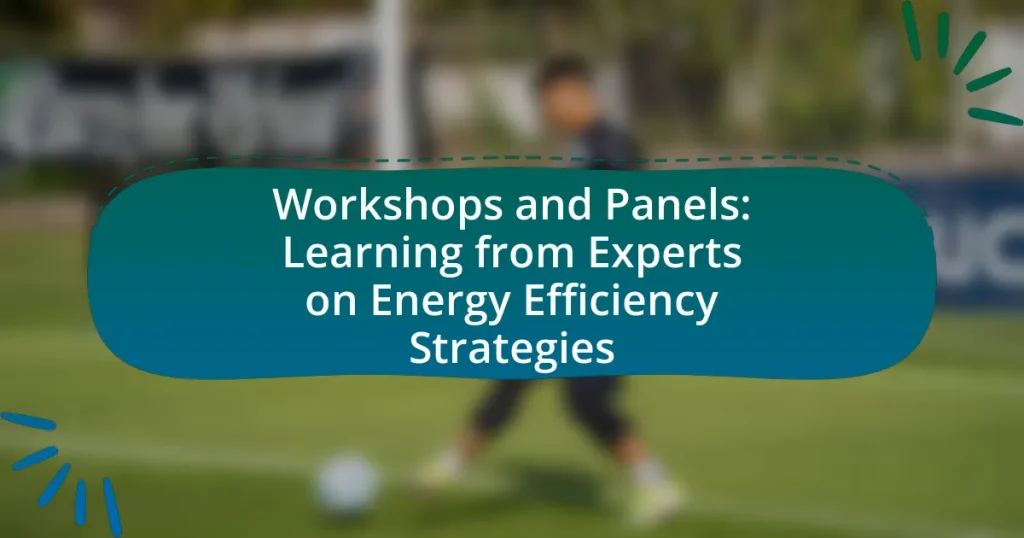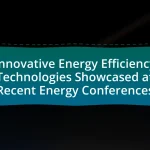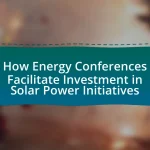Workshops and panels on energy efficiency strategies are organized events where experts share knowledge and innovative solutions aimed at improving energy efficiency. These gatherings facilitate interactive discussions, presentations, and Q&A sessions, enhancing participants’ understanding of energy-saving technologies and practices. Key topics covered include sustainable practices, technological innovations, and policy frameworks, with a focus on real-world applications and case studies. The events also address current challenges in the energy efficiency sector, fostering collaboration among industry leaders, researchers, and practitioners to promote effective strategies and solutions. Participants are encouraged to engage actively and network to maximize their learning experience and implement actionable insights in their own contexts.
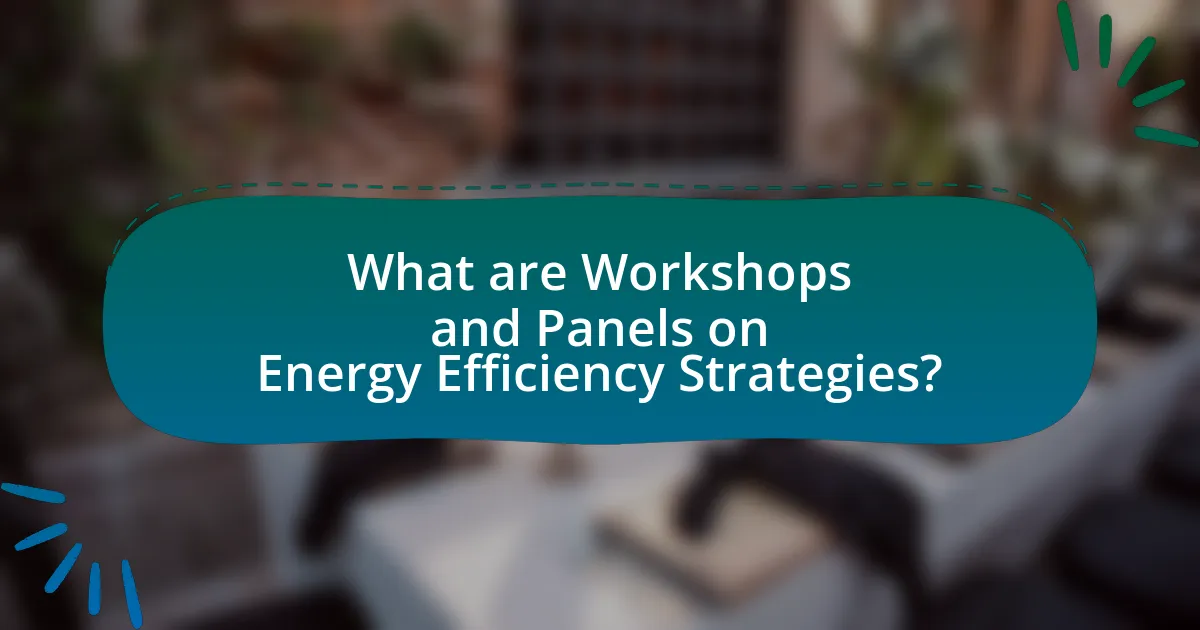
What are Workshops and Panels on Energy Efficiency Strategies?
Workshops and panels on energy efficiency strategies are organized events where experts share knowledge, best practices, and innovative solutions to improve energy efficiency. These gatherings typically involve presentations, discussions, and interactive sessions that facilitate learning and collaboration among participants. For instance, the U.S. Department of Energy frequently hosts workshops that focus on specific energy-saving technologies and methods, providing attendees with actionable insights and data-driven strategies to implement in their own contexts.
How do Workshops and Panels contribute to learning about Energy Efficiency?
Workshops and panels significantly enhance learning about energy efficiency by providing direct access to expert knowledge and practical insights. These events facilitate interactive discussions where participants can engage with industry leaders, ask questions, and share experiences, leading to a deeper understanding of energy-efficient practices. For instance, a study by the American Council for an Energy-Efficient Economy found that participants in workshops reported a 30% increase in their knowledge of energy efficiency technologies and strategies. This hands-on learning environment fosters collaboration and innovation, enabling attendees to apply new concepts effectively in their own contexts.
What types of formats are used in these Workshops and Panels?
Workshops and panels on energy efficiency strategies typically utilize formats such as interactive discussions, presentations, and Q&A sessions. These formats encourage participant engagement and facilitate knowledge sharing among experts and attendees. For instance, interactive discussions allow for real-time feedback and collaboration, while presentations provide structured information on specific topics. Q&A sessions enable participants to seek clarification and delve deeper into the subject matter, enhancing the overall learning experience.
Who are the typical speakers and experts involved in these events?
Typical speakers and experts involved in workshops and panels on energy efficiency strategies include industry leaders, academic researchers, policy makers, and practitioners with expertise in sustainable practices. These individuals often have extensive backgrounds in energy management, environmental science, engineering, and public policy, providing a diverse range of perspectives. For instance, professionals from organizations like the U.S. Department of Energy and universities known for their energy research frequently participate, sharing insights based on current research and successful case studies in energy efficiency.
Why are Workshops and Panels important for Energy Efficiency?
Workshops and panels are important for energy efficiency because they facilitate knowledge sharing and collaboration among experts, practitioners, and stakeholders. These events provide a platform for discussing innovative strategies, best practices, and emerging technologies that can significantly reduce energy consumption. For instance, a study by the American Council for an Energy-Efficient Economy (ACEEE) highlights that peer-to-peer learning in workshops can lead to a 10-20% increase in energy savings for participants who implement shared strategies. By engaging in these collaborative environments, attendees can gain insights that are directly applicable to their own energy efficiency initiatives, ultimately driving broader adoption of effective practices across various sectors.
What knowledge gaps do these events aim to fill?
These events aim to fill knowledge gaps related to the latest energy efficiency strategies and technologies. Specifically, they address the lack of awareness and understanding among participants regarding innovative practices, regulatory changes, and the economic benefits of energy efficiency. For instance, studies indicate that many organizations are unaware of available incentives and funding opportunities that can significantly reduce implementation costs. By providing expert insights and practical examples, these workshops and panels enhance participants’ ability to adopt effective energy-saving measures, thereby bridging the gap between theoretical knowledge and practical application in the field of energy efficiency.
How do they foster collaboration among participants?
They foster collaboration among participants by implementing interactive activities and structured discussions that encourage engagement. Workshops and panels often utilize breakout sessions where participants can share ideas and solutions in smaller groups, facilitating deeper connections and collaborative problem-solving. Additionally, expert-led discussions provide a platform for participants to ask questions and share experiences, enhancing collective learning. Research indicates that collaborative environments increase knowledge retention and innovation, as evidenced by studies showing that participants in interactive settings report higher satisfaction and engagement levels compared to traditional lecture formats.
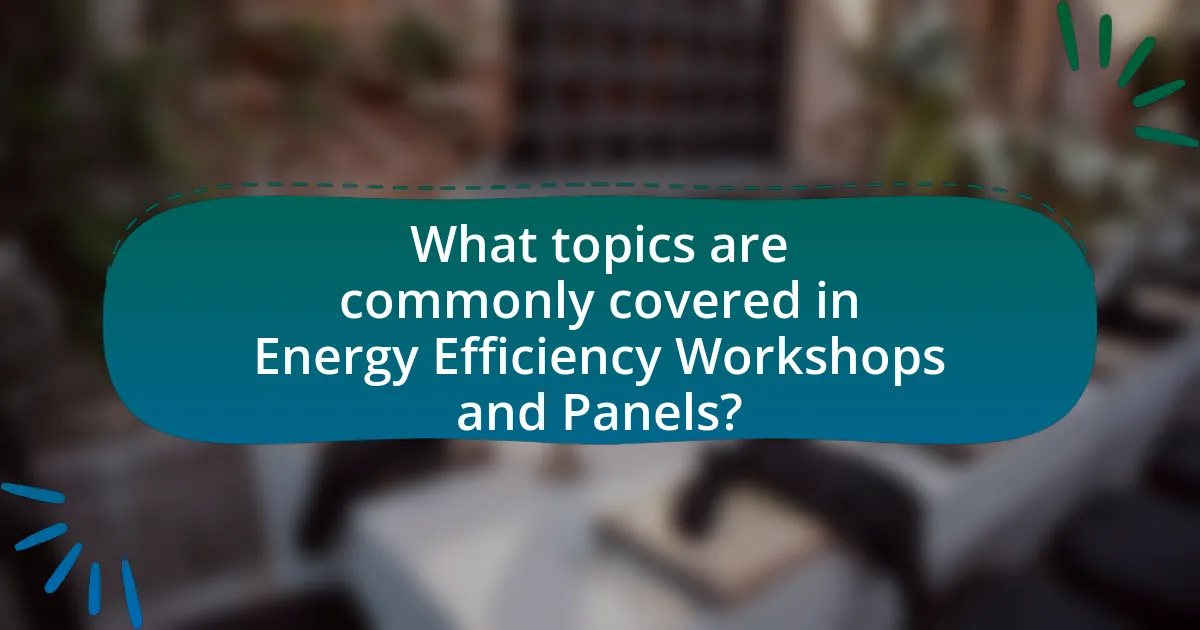
What topics are commonly covered in Energy Efficiency Workshops and Panels?
Energy efficiency workshops and panels commonly cover topics such as energy-saving technologies, building retrofitting techniques, renewable energy integration, energy management practices, and policy frameworks for energy efficiency. These subjects are essential for understanding how to reduce energy consumption and improve sustainability in various sectors. For instance, discussions often include the latest advancements in LED lighting, HVAC systems, and smart building technologies, which are proven to significantly lower energy usage. Additionally, workshops frequently address financial incentives and regulatory measures that support energy efficiency initiatives, providing participants with actionable insights and strategies to implement in their own projects.
What are the key themes discussed in these events?
The key themes discussed in the workshops and panels on energy efficiency strategies include sustainable practices, technological innovations, and policy frameworks. Sustainable practices focus on reducing energy consumption and promoting renewable energy sources, which are essential for mitigating climate change. Technological innovations highlight advancements in energy-efficient appliances and smart grid technologies that enhance energy management. Policy frameworks emphasize the role of government regulations and incentives in promoting energy efficiency, as evidenced by various case studies showcasing successful implementation in different regions.
How do case studies enhance the learning experience?
Case studies enhance the learning experience by providing real-world examples that illustrate theoretical concepts in practice. They allow learners to analyze complex situations, fostering critical thinking and problem-solving skills. For instance, a study published in the Journal of Educational Psychology found that students who engaged with case studies demonstrated a 20% increase in retention of material compared to traditional learning methods. This evidence supports the effectiveness of case studies in deepening understanding and facilitating practical application of knowledge.
What role does technology play in Energy Efficiency discussions?
Technology is crucial in Energy Efficiency discussions as it provides innovative solutions and tools that enhance energy management and reduce consumption. Advanced technologies such as smart grids, energy-efficient appliances, and building automation systems enable real-time monitoring and optimization of energy use. For instance, the U.S. Department of Energy reports that smart thermostats can reduce energy consumption by up to 10-12% annually. Additionally, data analytics and artificial intelligence facilitate informed decision-making, allowing stakeholders to identify inefficiencies and implement targeted improvements. These technological advancements are essential for achieving sustainability goals and fostering discussions around effective energy efficiency strategies.
How do Workshops and Panels address current challenges in Energy Efficiency?
Workshops and panels address current challenges in energy efficiency by facilitating knowledge exchange among experts, practitioners, and stakeholders. These events provide a platform for discussing innovative strategies, sharing best practices, and identifying barriers to implementation. For instance, the International Energy Agency reported that collaborative workshops have led to the development of actionable frameworks that enhance energy-saving technologies and policies. By engaging diverse perspectives, workshops and panels foster a comprehensive understanding of energy efficiency challenges and promote collaborative solutions.
What are the most pressing issues facing the industry today?
The most pressing issues facing the energy efficiency industry today include regulatory challenges, technological advancements, and funding constraints. Regulatory challenges arise from inconsistent policies across regions, which can hinder the implementation of energy-efficient practices. Technological advancements, while beneficial, require continuous adaptation and investment, as outdated systems may not integrate well with new solutions. Funding constraints limit the ability of organizations to invest in energy-efficient technologies, often due to competing budget priorities. According to the International Energy Agency, achieving significant energy savings requires overcoming these barriers, emphasizing the need for coordinated efforts among stakeholders to address these critical issues effectively.
How do experts propose solutions during these events?
Experts propose solutions during workshops and panels by leveraging collaborative discussions and evidence-based strategies. They engage participants in identifying challenges and brainstorming innovative approaches, often utilizing case studies and data to support their recommendations. For instance, during a workshop on energy efficiency, experts might present successful implementations from various sectors, demonstrating measurable outcomes such as a 30% reduction in energy consumption achieved by a specific technology. This method not only fosters a practical understanding of solutions but also encourages participants to adapt these strategies to their unique contexts.
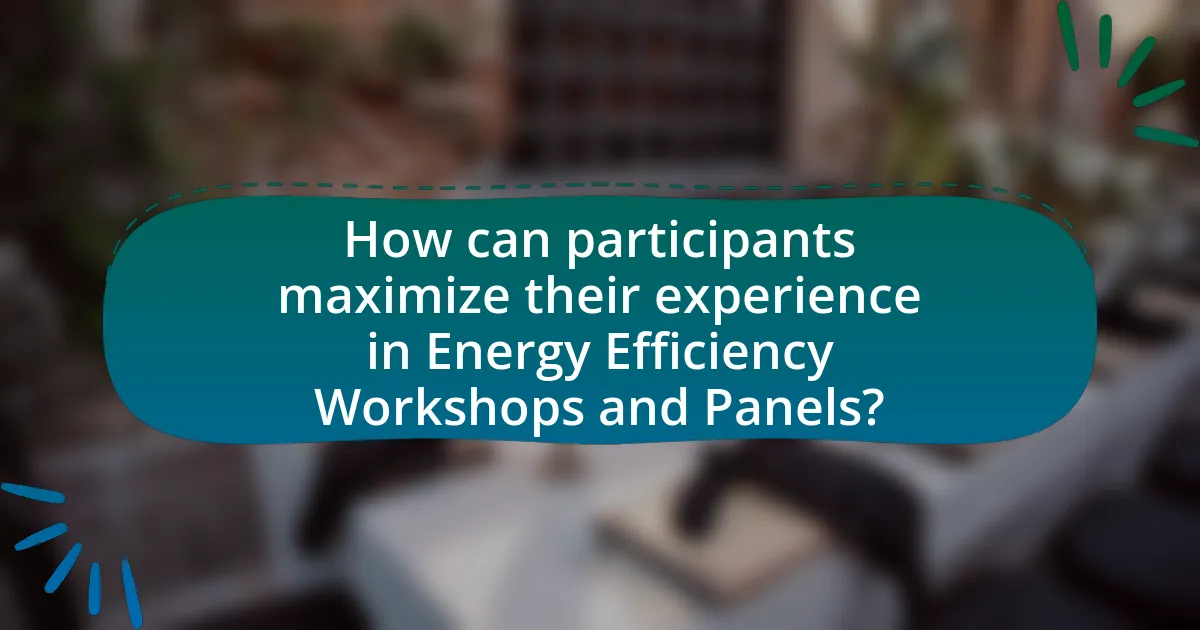
How can participants maximize their experience in Energy Efficiency Workshops and Panels?
Participants can maximize their experience in Energy Efficiency Workshops and Panels by actively engaging with the content and networking with experts and peers. Engaging in discussions, asking questions, and sharing personal experiences during sessions enhances understanding and retention of information. Networking allows participants to build connections that can lead to future collaborations and knowledge sharing. Research indicates that interactive participation increases learning outcomes, as demonstrated in studies showing that active learners retain 75% of information compared to 5% for passive listeners. Therefore, by being proactive in their involvement, participants can significantly enhance their workshop experience.
What strategies can attendees use to engage effectively?
Attendees can engage effectively by actively participating in discussions and asking questions during workshops and panels. This strategy encourages interaction and allows attendees to clarify concepts presented by experts. Research shows that active participation enhances learning outcomes, as demonstrated in a study by Freeman et al. (2014), which found that students who engage in active learning techniques perform better than those who do not. Additionally, networking with other attendees can foster collaboration and the exchange of ideas, further enriching the learning experience.
How can networking enhance the learning experience?
Networking enhances the learning experience by facilitating the exchange of knowledge and ideas among participants. Engaging with peers and experts during workshops and panels allows individuals to gain diverse perspectives on energy efficiency strategies, which can deepen understanding and inspire innovative solutions. Research indicates that collaborative learning environments, where networking is prevalent, lead to improved retention of information and greater application of concepts in real-world scenarios. For instance, a study published in the Journal of Educational Psychology found that students who actively engaged in networking activities demonstrated higher academic performance compared to those who did not. This evidence underscores the value of networking in enriching the educational process.
What follow-up actions should participants take after the event?
Participants should send thank-you emails to speakers and organizers after the event. This action fosters networking and expresses appreciation for the insights shared. Additionally, participants should review their notes and materials from the event to reinforce learning and identify actionable strategies for energy efficiency. Engaging with fellow attendees through follow-up discussions can also enhance understanding and collaboration on energy efficiency initiatives. Lastly, participants should implement at least one strategy learned during the event in their own practices, which can lead to measurable improvements in energy efficiency.
What are some best practices for organizing successful Workshops and Panels?
To organize successful workshops and panels, it is essential to define clear objectives and target audiences. Establishing specific goals ensures that the content is relevant and engaging for participants. Additionally, selecting knowledgeable speakers with expertise in energy efficiency strategies enhances credibility and provides valuable insights.
Effective promotion of the event through various channels, such as social media and email newsletters, increases attendance and engagement. Incorporating interactive elements, such as Q&A sessions and group discussions, fosters participant involvement and enhances learning outcomes.
Finally, gathering feedback post-event allows organizers to assess the effectiveness of the workshop or panel and identify areas for improvement in future events. Research indicates that events with structured feedback mechanisms see a 30% increase in participant satisfaction (Eventbrite, 2020).
How can organizers ensure diverse and relevant topics are covered?
Organizers can ensure diverse and relevant topics are covered by actively engaging a wide range of stakeholders in the planning process. This includes soliciting input from various community members, industry experts, and underrepresented groups to identify pressing issues and interests. Research shows that inclusive planning leads to a broader spectrum of topics, as evidenced by the National Endowment for the Arts, which found that diverse perspectives enhance the relevance and appeal of programming. Additionally, organizers can analyze current trends and challenges in energy efficiency to align topics with the latest developments, ensuring that discussions remain pertinent and informative.
What logistical considerations are crucial for a successful event?
Crucial logistical considerations for a successful event include venue selection, scheduling, resource allocation, and participant management. Venue selection must accommodate the expected number of attendees and provide necessary facilities, such as audio-visual equipment and accessibility options. Scheduling should consider the availability of speakers and the timing of sessions to maximize attendance and engagement. Resource allocation involves budgeting for materials, catering, and technology, ensuring all aspects are adequately funded and managed. Participant management includes registration processes, communication strategies, and on-site support to enhance the attendee experience. These considerations are supported by industry standards, which emphasize that effective planning directly correlates with event success rates, as evidenced by studies showing that well-organized events achieve higher satisfaction ratings among participants.
What resources are available for further learning on Energy Efficiency Strategies?
Resources available for further learning on Energy Efficiency Strategies include online courses, webinars, and industry conferences. For instance, organizations like the U.S. Department of Energy offer free online courses through platforms such as Energy.gov, which cover various aspects of energy efficiency. Additionally, the American Council for an Energy-Efficient Economy (ACEEE) hosts webinars and publishes reports that provide insights into best practices and emerging technologies in energy efficiency. Industry conferences, such as the Energy Efficiency Global Forum, also serve as valuable platforms for networking and learning from experts in the field.
